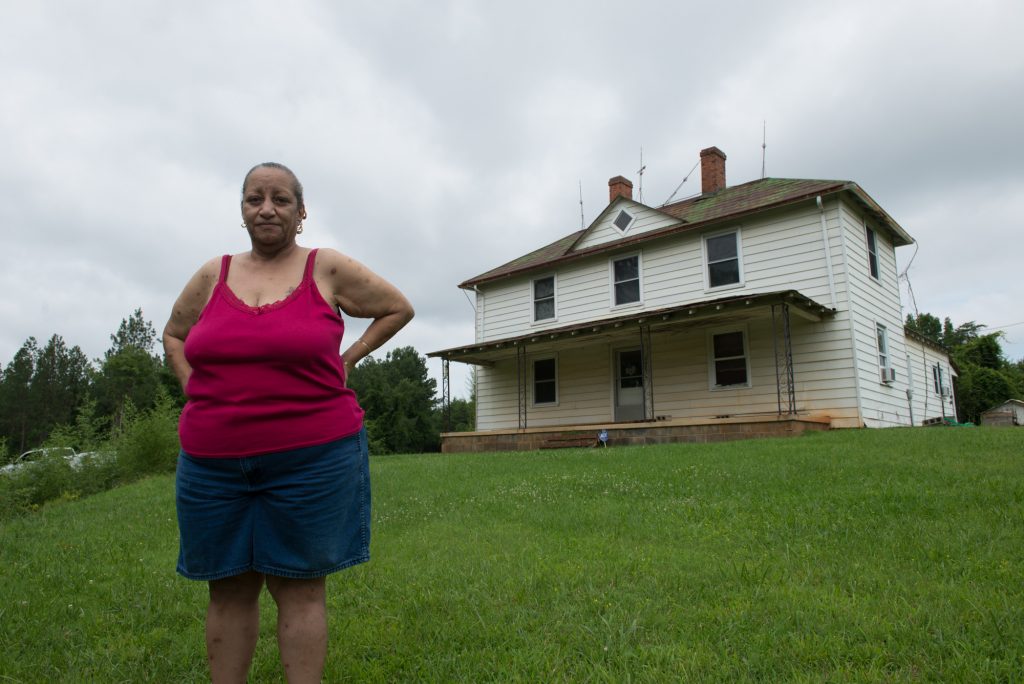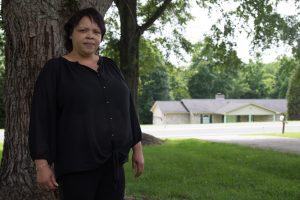North Carolina residents struggle with well contamination

Andree Davis stands in front of her home in Walnut Cove, North Carolina. Davis said she believes her well water has caused dark spots on her skin. (Photo by Jasmine Spearing-Bowen/News21)
WALNUT COVE, N.C. – Andree Davis said she tries not to go out in public: She’s afraid of how people will react when they see her.
The 67-year-old North Carolina resident has dark spots all over her body. Davis said when she absolutely has to leave her house, she always wears long sleeves and pants – even in the hottest weather.
“I started getting all these spots, and I thought it was the water of course, but I couldn’t prove it,” she said. “It’s everywhere – like on my stomach and just everywhere. It’s unbelievable.”
She moved from South Carolina to Walnut Cove in 2007 after inheriting family property. In 2012, she started developing the spots. Davis said new spots only appear when she showers with the water from her well. For a while, she showered at a nearby hotel and said she didn’t get any new spots, but the hotel became too expensive.
Davis blames her well water because she knows it contains chemicals such as chromium 6 and vanadium. In 2015, the North Carolina Department of Environmental Quality sent notices to nearly 1,000 households located near coal-fired power plants across the state advising them to use bottled water for drinking, cooking and brushing their teeth. The water wasn’t safe, the notice said, but it didn’t indicate the source of the pollutants.
Residents later received a second letter telling them their water was OK to drink, leaving many residents unsure of whether or not their water was safe.
Davis lives next to a Duke Energy power plant that burns coal and creates a byproduct referred to as coal ash. Companies often store this type of waste in large pits called impoundments, usually near waterways.

Duke Energy officials said they plan to excavate coal ash ponds at eight of its 14 plants across the state. However, the company plans to leave coal ash at Belews Creek Steam Plant (pictured here) near Walnut Cove, North Carolina. (Photo by Chelsea Ray Ybanez/News21)
Duke spokeswoman Paige Sheehan said the company is not the source of well pollution. However, the state passed legislation, the Coal Ash Management Act in 2014 and House Bill 630 in 2016, that requires Duke to close all coal ash impoundments, either by digging it up and storing it elsewhere or by putting a protective covering over the ash and leaving it where it is, a practice known as capping-in-place.
Environmental groups across North Carolina have pushed Duke to dig up the coal ash the company has stored in ponds across the state. Duke has roughly 150 million tons impounded in the state, a company spokeswoman said in an email.
Duke officials said they plan to excavate coal ash ponds at eight of the 14 plants across the state, but the company plans to leave coal ash in place at several locations, including Belews Creek Steam Plant near Walnut Cove, where Davis lives.
As part of the state legislation, Duke must provide alternative drinking water sources, in the form of city water or filtration systems, to anyone living within half a mile of its coal-fired power plants. Duke has until 2018 to provide the alternative water sources, and it has been providing bottled water for residents since 2015.
The company also has offered affected coal-plant neighbors an optional $5,000 payment and money to offset other costs, but accepting it means waiving their rights to sue Duke in the future.
Tracey Edwards, a Walnut Cove resident, said nobody she knows plans to take the money because “people aren’t that stupid.” She believes coal ash is the source of the chemicals in the water.
“You’re trying to be a good so called ‘neighbor’ by providing water, who does that? If you aren’t guilty, why are you getting involved at all? Am I right or wrong? Why would you give all these people, for this period of time, all this free water?” Edwards said. “That’s not being a good neighbor. You’re guilty, and you’re trying to buy people off, simple as that.”

Tracey Edwards stands in the front yard of her home in Walnut Cove, North Carolina. She blames coal ash for contaminanting the water in her community. (Photo by Jasmine Spearing-Bowen/News21)
Debra Watts, from the North Carolina Division of Water Resources, said they are still working on site assessments to determine the source of the contamination. But the state legislation mandating Duke provide water to residents near coal ash was a protective measure, she said.
Duke will connect residents to city water if they live in more urban areas such as Belmont. But for rural areas such as Walnut Cove and Roxboro, Sheehan said the residents live too far from city water sources to provide water, and filtration systems are the best and most cost effective option.
Cathy Cralle Jones, an attorney representing some residents, said access to city water is important for the future of these communities.
“It brings value to that community, to be able to embrace future development,” she said. “If filtration systems are the only option for those communities, in my perspective, those areas are doomed to long-term economic depression.”
She also said rural communities are at a disadvantage because they don’t have as strong a voice as some more populated areas.
“It is just harder for these more rural communities to organize in the same way,” she said. “I do think there is a low-income, racial component that has prevented the kind of attention and equity for these plants versus the more urban settings.”
Davis saw a doctor about her skin condition initially, but she said none of the creams they prescribed helped clear up her spots.
She was in the process of selling her home when she got her letter. Davis said she feels stuck in a house she can’t sell because of the contaminated well.
She spent a large portion of her retirement savings on fixing up the house, and can’t afford to move until it’s sold. Davis said she feels like she’s in prison.
“I’m not going to say I haven’t been through things, but I can work them out and take care of them,” she said. “But this is non-ending. And I don’t see any light at the end of the tunnel. And I don’t want to end up this being my final resting place.”
Come back Aug. 14 to see the full News21 report on “Troubled Water.”